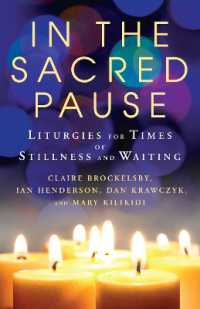Full Description
Guide to develop formal treatment plans for third-party payers and state and federal review agencies
Pressure from accrediting agencies and other outside parties has increased the need for clinicians to produce effective, high-quality treatment plans; Treatment Planners provide all the elements necessary to quickly and easily develop formal treatment plans that satisfy the needs of most third-party payers and state and federal review agencies. This second edition has been updated with new chapters and appendices, and enables readers to stimulate clinical thought to improve the quality and comprehensiveness of treatment plans, and to reduce the time involved in recordkeeping.
In this new edition, readers will find:
New chapters on Anxiety, Attention-Deficit/Hyperactivity Disorder, Bipolar Disorder, Low Self-Esteem, Obsessive-Compulsive and related Disorders, Opioid Use Disorder, Panic Disorder/Agoraphobia, Sexual Promiscuity, Sleep Disturbance, Social Anxiety, and Specific Phobia
New Objectives and Interventions consistent with identified evidence-based practices
Integrated DSM-5 diagnostic labels and codes into the Diagnostic Suggestions section of each chapter
More suggested homework assignments integrated into the Interventions
Treatment Planners help practitioners clarify, simplify, and accelerate the treatment planning process, so they spend less time on paperwork and more time with their clients.
Contents
Preface ix
Acknowledgments xi
About the Companion Website xiii
Introduction 1
Abusive Relationships 18
Academic Major Selection 29
Academic Underachievement 37
Antisocial Behavior 49
Anxiety 61
Attention- Deficit/Hyperactivity Disorder (ADHD) Adult 75
Bipolar Disorder Depression 90
Bipolar Disorder Mania 104
Career Choice Confusion 118
Childhood Trauma 126
Depression Unipolar 139
Diversity Acceptance 154
Eating Disorders 164
Family Conflict 180
Financial Stress 194
Graduation Anxiety 205
Grief/Loss Unresolved 217
Homesickness/Emancipation Issues 228
Intimacy/Commitment Issues 240
Learning/Physical Disabilities 251
Loneliness 262
Low Self- Esteem 273
Obsessive- Compulsive and Related Disorders 284
Opioid Use Disorder 298
Panic Disorder/Agoraphobia 314
Pregnancy 329
Psychoticism 337
Roommate Conflicts 353
Self- Harm 365
Sexual Abuse Victim 377
Sexual Assault Victim 388
Sexual Orientation Confusion 400
Sexual Promiscuity 412
Sleep Disturbance 422
Social Anxiety 434
Specific Phobia 447
Substance Use 460
Suicidal Ideation 476
Time Management 491
Appendix A: Bibliotherapy Suggestions 501
Appendix B: Professional Resources 525
Appendix C: Recovery Model Objectives and Interventions 551
Appendix D: Cited and Commonly Used Assessment Instruments and Their Sources 559
Appendix E: References to Empirical Support for Evidence-Based Content (Accessible via www.wiley.com/go/stout/collegeTP2e)








